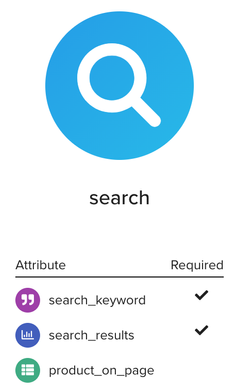Event specifications
Event specifications represent your data layer in EventStream and provide a way to organize and validate the quality of incoming data.
As mentioned in earlier tutorials, events are identified by the tealium_event attribute. The value of this attribute represents the name of the event and its associated specification. The specification also indicates which event attributes are required in the event.
How it works
Event specifications define and standardize the events you want to collect in your EventStream implementation.
Here’s how it works:
- Event name and attributes
An event specification has a name and a list of required/optional attributes. The name is the value set in thetealium_eventattribute. For example, an event that tracks when a user performs a search would be represented bytealium_event="search"and would have required attributessearch_termandsearch_resultscontaining the searched term and the number of results returned respectively. - Marketplace or custom specs
EventStream comes with a marketplace of predefined event specifications for the most commonly tracked events, such ascart_add,screen_view, andsearchto name a few. You can use these built-in specifications or create custom ones. - Data sources
After you add specifications, they can be associated to data sources. Specs are platform neutral, so a standard event such assearchshould be implemented the same in each platform. However, not all specifications apply to every type of data source. On the Data Sources screen, you associate specifications to the data sources that implement them. - Get code and installation guide
When specifications are associated to a data source, the installation guide automatically includes code samples for each one. - Data validation
The Live Events screen now reflects the quality of your data based on the events that match specifications and if they contain the required attributes.
Example event specification

{
"tealium_event" : "search",
"search_keyword" : "STRING", // the searched term
"search_results" : NUMBER, // number of results
"product_on_page" : ["STRING"] // array of product strings
}
The next tutorial explains how to add an event specification.
This page was last updated: March 11, 2024